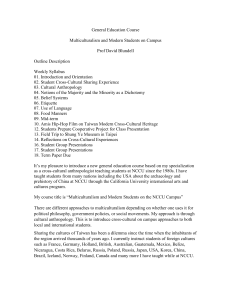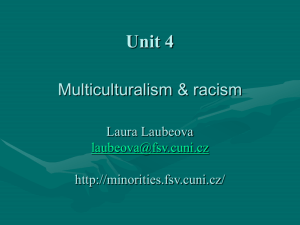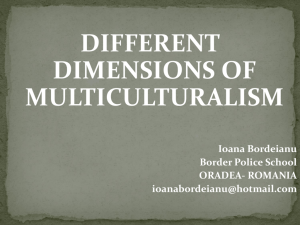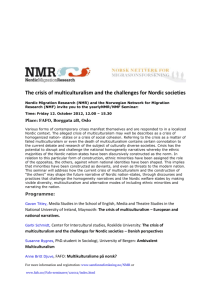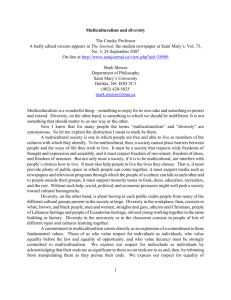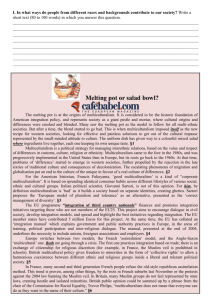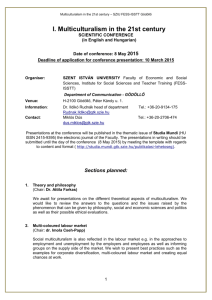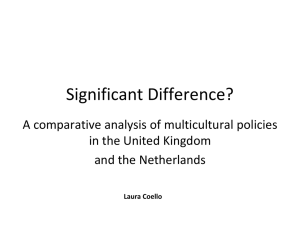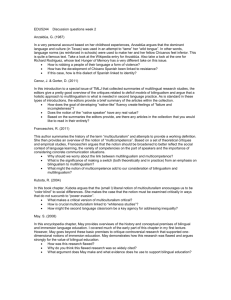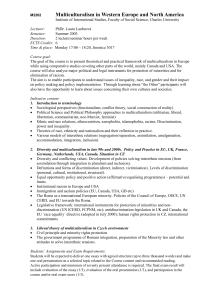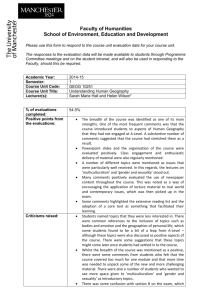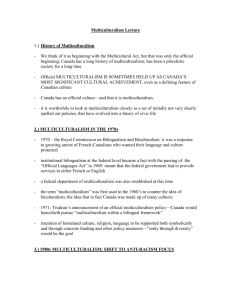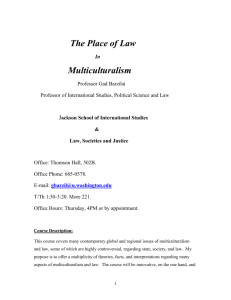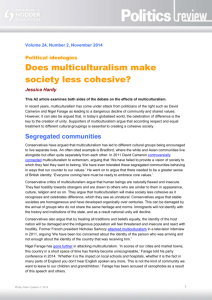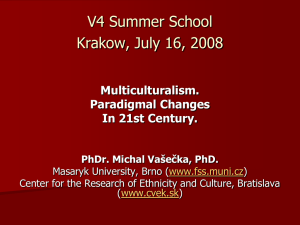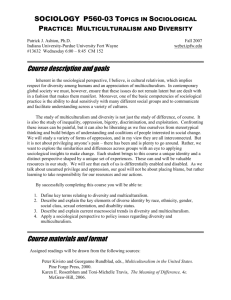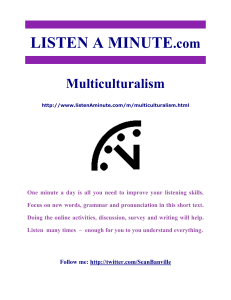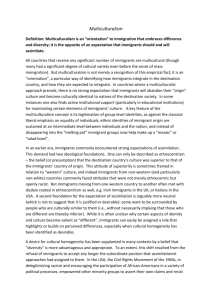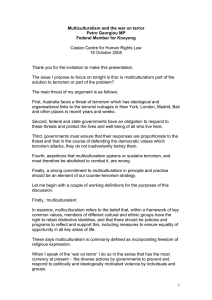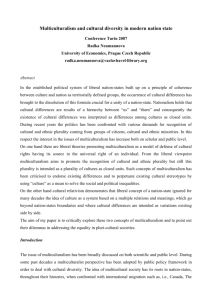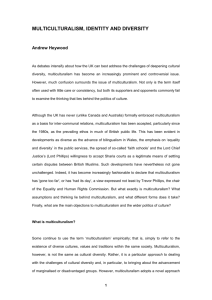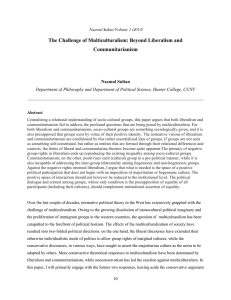Multiculturalism_&_Modern_Citizen_on_Campus_Spring_2015
advertisement
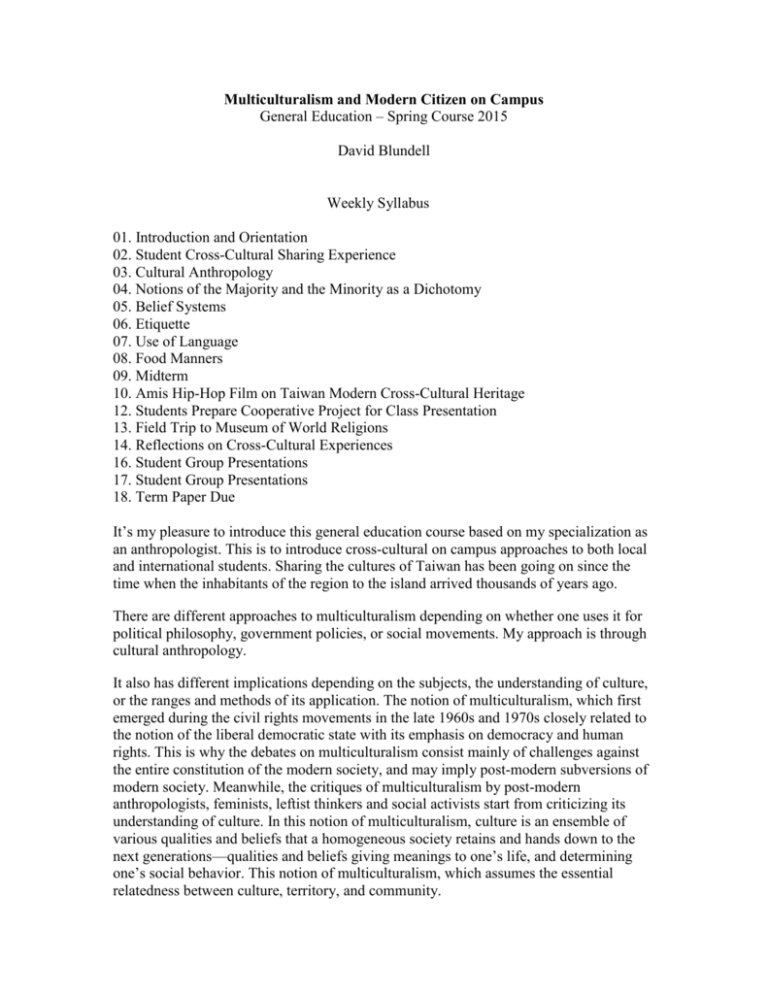
Multiculturalism and Modern Citizen on Campus General Education – Spring Course 2015 David Blundell Weekly Syllabus 01. Introduction and Orientation 02. Student Cross-Cultural Sharing Experience 03. Cultural Anthropology 04. Notions of the Majority and the Minority as a Dichotomy 05. Belief Systems 06. Etiquette 07. Use of Language 08. Food Manners 09. Midterm 10. Amis Hip-Hop Film on Taiwan Modern Cross-Cultural Heritage 12. Students Prepare Cooperative Project for Class Presentation 13. Field Trip to Museum of World Religions 14. Reflections on Cross-Cultural Experiences 16. Student Group Presentations 17. Student Group Presentations 18. Term Paper Due It’s my pleasure to introduce this general education course based on my specialization as an anthropologist. This is to introduce cross-cultural on campus approaches to both local and international students. Sharing the cultures of Taiwan has been going on since the time when the inhabitants of the region to the island arrived thousands of years ago. There are different approaches to multiculturalism depending on whether one uses it for political philosophy, government policies, or social movements. My approach is through cultural anthropology. It also has different implications depending on the subjects, the understanding of culture, or the ranges and methods of its application. The notion of multiculturalism, which first emerged during the civil rights movements in the late 1960s and 1970s closely related to the notion of the liberal democratic state with its emphasis on democracy and human rights. This is why the debates on multiculturalism consist mainly of challenges against the entire constitution of the modern society, and may imply post-modern subversions of modern society. Meanwhile, the critiques of multiculturalism by post-modern anthropologists, feminists, leftist thinkers and social activists start from criticizing its understanding of culture. In this notion of multiculturalism, culture is an ensemble of various qualities and beliefs that a homogeneous society retains and hands down to the next generations—qualities and beliefs giving meanings to one’s life, and determining one’s social behavior. This notion of multiculturalism, which assumes the essential relatedness between culture, territory, and community. 2 Secondly, multiculturalism emphasizes one single closed group identity in terms of ancestors, blood lineages, cultural rituals, or behavior and therefore could produce biases against, for example, those migrants who are actively involved in cultural formations in their host society. Thirdly, multiculturalism is a top-down policy and can be nothing but a clever strategy for managing social minorities. Even when the government does not intentionally use approaches of multiculturalism for the purpose of concealing sociopolitical inequalities, reading socio-economic problems as cultural ones could lead to reductionism. Lastly, multiculturalism tends to dangerously define the notions of the majority and the minority as a dichotomy, something that could therefore solidify the privileged status of the majority while keeping the minority marginalized. These discussions on multiculturalism tell us that we need a deeper understanding of culture and cultural identity. We need to further understand that culture is not a fixed reality. It is something creative, ever-changing, hybrid and pervasive. It is an arena in which relationships, agency, and power operate simultaneously constituting identities. How is the citizen ‘turned on’? That is, how does one ‘switch’ from being a private person to being a citizen? This article investigates how several prominent models of politics and citizenship account for this switch. In particular, the role of (cultural) identity in performing the ‘switch’ is highlighted. In the ‘standard’ liberal model, the switch from private to public is considered an unproblematic ‘mind switch’. In the communitarian model, on the contrary, it is considered impossible: the good citizen must be a good person. Requirements Students will be asked to bring the same notebook to class each time to enter work as a course journal. When writing students will leave a line blank (doubled-spaced) in order for the teacher to correct and comment on the work. The requirements for this course include attending the class and participation writing exercises and examinations. (1) 10% of the final score will depend on attending the class. Each class will be recorded as to the student’s participation and marked on a name list. (2) Another 10% the student’s score will depend on assignments of writing in class or given as homework. (3) 20% of the score will be based on presentations in class. (4) 20% for mid-term. (5) 20% for final evaluation. (6) 20% for notebooks. References Benhabib, S. (2002). The claims of culture: Equality and diversity in the global era. Princeton, N.J.: Princeton University Press. Castles, S. and Davidson, A. (2000). Citizenship and migration: Globalization and the politics of belonging. London and New York, Routledge. Constable, N. (ed.). (2005). Cross-border marriages: Gender and mobility in transnational Asia. Philadelphia: University of Pennsylvania Press. 3 Cowan, J. K. (2006). “Culture and rights after culture and rights,” American Anthropologist, 108 (1), 9-24. Ehrenreich, B. and Hochschild, A. R. (eds.). Global women: Nannies, maids & sex workers in the new economy. N.Y.: Metropolitan Books, Henry Holt & Company. Fraser, N. and Honneth, A. (2003). Redistribution or recognition? A Politicalphilosophical exchange. (J. Golb, J. Ingram, C. Wilke, Trans.). London and New York: Verso. Okin, S. M. (1999). “Feminism and multiculturalism: Some tensions,” in Avnon, D. and de-Shalit, A (eds.). Liberalism and its practice. London and New York: Routledge. Ong, A. (2007). Neo-liberalism as exception: Mutations in citizenship and sovereignty. Durham and London: Duke University Press. Parrenãs, R. S. (2001). Servants of globalisation: Women, migration and domestic work. Stanford University Press.
